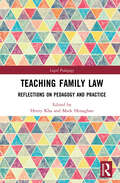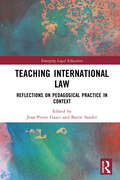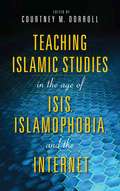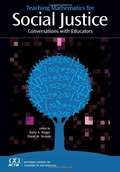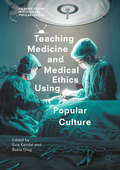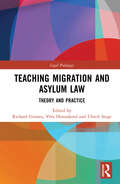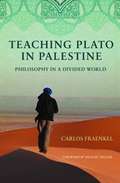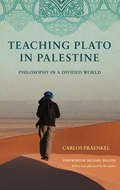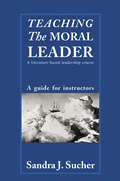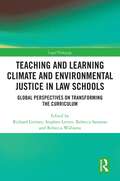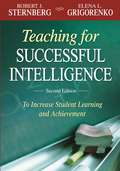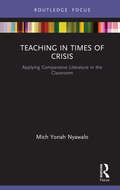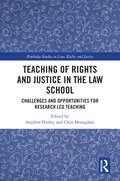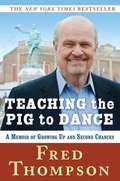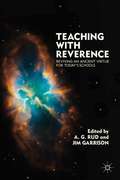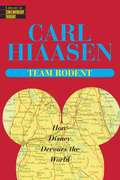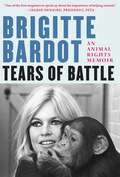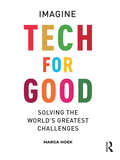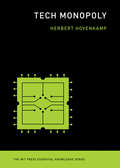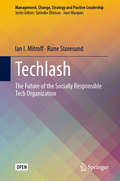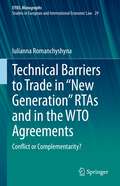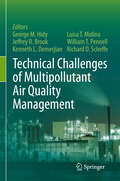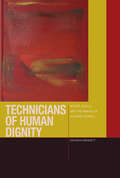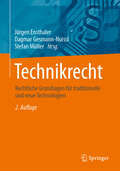- Table View
- List View
Teaching Family Law: Reflections on Pedagogy and Practice (Legal Pedagogy)
by Henry Kha and Mark HenaghanThis book provides a comprehensive analysis of the teaching of an eclectic range of family law topics and the unique opportunities and challenges of teaching family law in different jurisdictions from a varied international perspective. Written by leading legal scholars, the book addresses a gap in the scholarship to comprehensively and systematically analyse the teaching of family law. The first part of the book explores ways of teaching the varied range of topics under the heading of family law and captures the diverse approaches to the discipline. Chapters illustrate how the subject can be best taught in an interdisciplinary way that considers feminist perspectives and the philosophy of teaching, while encompassing legal positivism, empirical research and critical legal theory. The second part of the book examines teaching in different jurisdictions and illustrates policy and practice in Australia, New Zealand, the United States, Canada, the United Kingdom, Hong Kong and South Africa. Showcasing examples of best practice of teaching family law, the book will be an essential reading for legal scholars, as well as researchers and postgraduate students in the fields of family law and legal education.
Teaching International Law: Reflections on Pedagogical Practice in Context (ISSN)
by Barrie Sander Jean-Pierre GauciThe practice of teaching international law is conducted in a wide range of contexts across the world by a host of different actors – including scholars, practitioners, civil society groups, governments, and international organisations.This collection brings together a diversity of scholars and practitioners to share their experiences and critically reflect on current practices of teaching international law across different contexts, traditions, and perspectives to develop existing conversations and spark fresh ones concerning teaching practices within the field of international law. Reflecting on the responsibilities of teachers of international law to engage with and confront histories, contemporary crises, and everyday events in their teaching, the collection explores efforts to decenter the teacher and the law in the classroom, opportunities for dialogical and critical approaches to teaching, and the possibilities of co-producing non-conventional pedagogies that question the mainstream underpinnings of international law teaching. Focusing on the tools and techniques used to teach international law to date, the collection examines the teaching of international law in different contexts. Traversing a range of domestic and regional contexts around the world, the book offers insights into both the culture of teaching in particular domestic settings, aswell as the structural challenges and obstacles that arise in terms of who, what, and how international law is taught in practice.Offering a unique window into the personal experiences of a diversity of scholars and practitioners from around the world, this collection aims to nurture conversations about the responsibilities, approaches, opportunities, and challenges of teaching international law.
Teaching Islamic Studies in the Age of ISIS, Islamophobia, and the Internet
by Courtney M. DorrollHow can teachers introduce Islam to students when daily media headlines can prejudice students' perception of the subject? Should Islam be taught differently in secular universities than in colleges with a clear faith-based mission? What are strategies for discussing Islam and violence without perpetuating stereotypes? The contributors of Teaching Islamic Studies in the Age of ISIS, Islamophobia, and the Internet address these challenges head-on and consider approaches to Islamic studies pedagogy, Islamaphobia and violence, and suggestions for how to structure courses. These approaches acknowledge the particular challenges faced when teaching a topic that students might initially fear or distrust. Speaking from their own experience, they include examples of collaborative teaching models, reading and media suggestions, and ideas for group assignments that encourage deeper engagement and broader thinking. The contributors also share personal struggles when confronted with students (including Muslim students) and parents who suspected the courses might have ulterior motives. In an age of stereotypes and misrepresentations of Islam, this book offers a range of means by which teachers can encourage students to thoughtfully engage with the topic of Islam.
Teaching Law
by Robin L. WestTeaching Law reimagines law-school teaching and scholarship by going beyond crises now besetting the legal academy and examining deeper and longer-lasting challenges. The book argues that the legal academy has long neglected the needs to focus teaching and scholarship on the ideals of justice that law fitfully serves, the political origins of law, and the development of a respectful but critical relationship with the legal profession. This book suggests reforms to improve the quality of legal education and responds to concerns that law schools eschew the study of justice, rendering students amoralist; that law schools slight the political sources of law, particularly in legislative action; and that law schools have ignored the profession entirely. These areas of neglect have impoverished legal teaching and scholarship as the academy is refashioned in response to current financial exigencies, and addressing them is long overdue.
Teaching Mathematics for Social Justice: Conversations with Educators
by David W. Stinson Anita A. WagerMathematics as a Catalyst for Change for ALL Students. <P><P>Educators increasingly recognize the important role that mathematics teaching plays in helping students to understand and overcome social injustice and inequality. This collection of original articles is the start of a compelling conversation among some of the leading figures in critical and social justice mathematics, a number of teachers and educators who have been inspired by them and who have inspiring stories of their own to tell and any reader interested in the intersection of education and social justice. An important read for every educator, this book shows how to teach mathematics so that all students are given the tools they need to confront issues of social justice today and in the future.
Teaching Medicine and Medical Ethics Using Popular Culture
by Evie Kendal Basia DiugThis book demonstrates how popular culture can be successfully incorporated into medical and health science curriculums, capitalising on the opportunity fictional media presents to humanise case studies. Studies show that the vast majority of medical and nursing students watch popular medical television dramas and comedies such as Grey's Anatomy, ER, House M. D. and Scrubs. This affords us with a unique opportunity to engage and inform not only students but the general public and patients further downstream. This volume analyses examples of medical-themed popular culture and offers various strategies and methods for educators in this field to integrate this material into their teaching. The result is a fascinating read and original resource for medical professionals and teachers alike.
Teaching Migration and Asylum Law: Theory and Practice (Legal Pedagogy)
by Richard Grimes Ulrich Stege Věra HonuskováThis highly topical book demonstrates the theoretical and practical importance of the study of migration law. It outlines approaches that may be taken in the design, delivery and monitoring of this study in law schools and universities to ensure an optimum level of learning. Drawing on examples of best practice from around the world, this book uses a theoretical framework and examples from real clients to simulations to help promote the learning and teaching of the law affecting migrants. It showcases contributions from over 30 academics and practitioners experienced in asylum and immigration law and helps to unpick how to teach the complex international laws and procedures relating to migration between different countries and regions. The various sections of the book explore educational best practice, what content can be covered, models for teaching and learning, strategies to deal with challenges and ways forward. The book will appeal to scholars, researchers and practitioners of migration and asylum law, those teaching migration law electives and involved in curriculum design, as well as students of international, common and civil law.
Teaching Plato in Palestine
by Michael Walzer Carlos FraenkelTeaching Plato in Palestine is part intellectual travelogue, part plea for integrating philosophy into our personal and public life. Philosophical toolkit in tow, Carlos Fraenkel invites readers on a tour around the world as he meets students at Palestinian and Indonesian universities, lapsed Hasidic Jews in New York, teenagers from poor neighborhoods in Brazil, and the descendants of Iroquois warriors in Canada. They turn to Plato and Aristotle, al-Ghazālī and Maimonides, Spinoza and Nietzsche for help to tackle big questions: Does God exist? Is piety worth it? Can violence be justified? What is social justice and how can we get there? Who should rule? And how shall we deal with the legacy of colonialism? Fraenkel shows how useful the tools of philosophy can be--particularly in places fraught with conflict--to clarify such questions and explore answers to them. In the course of the discussions, different viewpoints often clash. That's a good thing, Fraenkel argues, as long as we turn our disagreements on moral, religious, and philosophical issues into what he calls a "culture of debate." Conceived as a joint search for the truth, a culture of debate gives us a chance to examine the beliefs and values we were brought up with and often take for granted. It won't lead to easy answers, Fraenkel admits, but debate, if philosophically nuanced, is more attractive than either forcing our views on others or becoming mired in multicultural complacency--and behaving as if differences didn't matter at all.
Teaching Plato in Palestine: Philosophy in a Divided World
by Michael Walzer Carlos FraenkelTeaching Plato in Palestine is part intellectual travelogue, part plea for integrating philosophy into our personal and public life. Philosophical toolkit in tow, Carlos Fraenkel invites readers on a tour around the world as he meets students at Palestinian and Indonesian universities, lapsed Hasidic Jews in New York, teenagers from poor neighborhoods in Brazil, and the descendants of Iroquois warriors in Canada. They turn to Plato and Aristotle, al-Ghaz?l? and Maimonides, Spinoza and Nietzsche for help to tackle big questions: Does God exist? Is piety worth it? Can violence be justified? What is social justice and how can we get there? Who should rule? And how shall we deal with the legacy of colonialism? Fraenkel shows how useful the tools of philosophy can be--particularly in places fraught with conflict--to clarify such questions and explore answers to them. In the course of the discussions, different viewpoints often clash. That's a good thing, Fraenkel argues, as long as we turn our disagreements on moral, religious, and philosophical issues into what he calls a "culture of debate." Conceived as a joint search for the truth, a culture of debate gives us a chance to examine the beliefs and values we were brought up with and often take for granted. It won't lead to easy answers, Fraenkel admits, but debate, if philosophically nuanced, is more attractive than either forcing our views on others or becoming mired in multicultural complacency--and behaving as if differences didn't matter at all.
Teaching The Moral Leader: A Guide for Instructors
by Sandra J. SucherThis book is a comprehensive, practical manual to help instructors integrate moral leadership in their own courses, drawing from the experience and resources of the Harvard Business School course 'The Moral Leader', an MBA elective taken by thousands of HBS students over nearly twenty years. Through the close study of literature--novels, plays, and historical accounts-- followed by rigorous classroom discussion, this innovative course encourages students to confront fundamental moral challenges, to develop skills in moral analysis and judgment, and to come to terms with their own definition of moral leadership. Using this guide's background material and detailed teaching plans, instructors will be well prepared to lead their students in the study of this vital and important subject. Featuring a website to run alongside that links the manual with the textbook and provides a wealth of extra resources, including on-line links to Harvard Business School case studies and teaching notes this manual forms a perfect complement to The Moral Leader core text also by Sandra Sucher. The detailed and hands-on nature of the guide makes it possible for instructors, with or without a specialized background, to replicate the 13-session Harvard Business School course, or to integrate moral leadership into an existing course, or as a module, or as stand-alone sessions. The manual presents flexible class plans, easily adaptable to a wide variety of business and academic topics. It suggests how to adapt the course to other settings, provides supporting materials, and reviews the approach to teaching "The Moral Leader," differentiating it from other literature-based courses. The author, a Harvard Business School professor with a successful record in teaching this course, also brings into the text the kind of real world understanding of effective leadership development that comes from decades of experience as a high level corporate executive. An accompanying student book, focused on class preparation and the context of each work, helps students address questions like: What is the nature of a moral challenge? How do people "reason morally"? How do leaders – formal and informal – contend with the moral choices they face? How is moral leadership different from leadership of any other kind? Struggling with these questions, both individually and as members of a vibrant learning community, students internalize moral leadership concepts and choices, and develop the skills to pursue it in their careers and personal lives.
Teaching and Learning Climate and Environmental Justice in Law Schools: Global Perspectives on Transforming the Curriculum (Legal Pedagogy)
by Richard Grimes Clemens Kaupa Richard Owen Rebecca Williams Andrea Ross Sean Whittaker Ulrich Stege Kim Bouwer Stephen Levett Rebecca Samaras Hubert Algie Tom Brenan Camila Bustos Abigail Fleming Isobel Graham Arpitha Kodiveri Christina Mosalagae Ashley Nemeth Michael Robinson-Dorn David Rossati Douglas Ruley Harrison Singh Parker Vize Sue WillmanArguing for the critical importance of the topic within law school curricula (whether for academic credit purposes or not), this novel and exceptionally timely book explores a fundamental question: should law schools teach about climate and environmental justice?Despite the urgency of climate and environmental protection issues, many law schools present the topic as optional for students or don’t engage at all. Arguing for the inclusion of climate and environmental justice at the earliest possible opportunity, this book presents study models in a variety of contexts and jurisdictions to support research into curriculum development and design. Case study examples of planned climate and environmental justice research and offerings at national and international levels are presented to support those who wish to include and/or expand provisions. This book also addresses concerns and initiatives of indigenous peoples, demonstrating how partnerships between law schools and others remain integral to establishing sustainable learning initiatives.Ultimately promoting and supporting the study of climate and environmental justice in a legal and applied context, this book will be of interest to scholars, researchers and academics involved with sustainability education, training and leadership, legal education and curriculum design. Clinical legal educators may also find the volume of interest.
Teaching for Successful Intelligence: To Increase Student Learning and Achievement
by Robert Sternberg Elena GrigorenkoCoauthored by two internationally renowned educators and researchers, this resource helps teachers strengthen their classroom practice with lessons that promote successful intelligence--a set of abilities that allow students to adapt and succeed within their environment, make the most of their strengths, and learn to compensate for their weaknesses.
Teaching in Times of Crisis: Applying Comparative Literature in the Classroom (Routledge Studies in Comparative Literature)
by Mich Yonah NyawaloTeaching in Times of Crisis explores how comparative methods, which are instrumental in reading and teaching works of literature from around the world, also provide us with tools to dissect and engage the moments of crises that permeate our contemporary political realities. The book is written in the form of a series of classroom reflections—or memos—capturing the political environment preceding and proceeding the 2016 US presidential election. It examines the ways in which the ethics involved in reading comparatively can be employed by teachers and students alike to map and foster "lifelines for cultural sustainability" (to borrow the term from Djelal Kadir’s Memos from the Besieged City) that are essential for creating and maintaining a healthy multicultural society. Nyawalo achieves this through comparative readings of postcolonial films, LGBTQ texts, French slam poetry, as well as episodes from Star Trek: The Next Generation, among other materials. The classroom reflections captured in each memo are shaped by the Appalachian setting in which the discussions and lessons took place. Inspired by this setting, the author develops pedagogic ethics of comparison—a method of reading comparatively—which privileges the local educational spaces in which students find themselves by mapping the contested cultural politics of Appalachian realities onto a world literature curriculum.
Teaching of Rights and Justice in the Law School: Challenges and Opportunities for Research Led Teaching (Routledge Studies in Law, Rights and Justice)
by Stephen Hurley and Chris MonaghanThis book examines the challenges of bringing cutting-edge research in often controversial areas into the law syllabus and explores how academics can effectively adopt a holistic approach to research and pedagogy when teaching rights and justice. The collection brings together experts from all areas of legal scholarship to discuss how they fuse often controversial aspects of rights and justice into their teaching in a way that responds to and is ultimately led by academic research. As such, it advances legal education through the opportunity to explore the interplay between rights and justice and how scholars both ensure that their teaching is research-led, whilst responding to the needs and views of students and issues such as generational differences in viewpoints on controversial issues. This topical volume will appeal to academics and researchers interested in academic freedom, the challenges of research-led teaching and the pedagogy around the teaching of rights and justice.
Teaching the Pig to Dance: A Memoir of Growing Up and Second Chances
by Fred ThompsonFred Thompson has enjoyed a remarkable career in Hollywood and politics, but when he sat down to write a memoir about how he got to be the person he is, he discovered that his best stories all seemed to come out of the years he spent growing up in and around his hometown of Lawrenceburg, Tennessee. It was a small town but not the smallest--after all, it was the county seat and it did have a courthouse, a couple of movie theaters, and its own Davy Crockett statue. For truly small, you had to travel to nearby Summertown, where the regular Sunday dinner was possum and chocolate gravy. But Lawrenceburg is where Fred got to be a kid, found his share of trouble and scrapes, came to know folks he didn't realize were so colorful at the time but sure does now, got married, had a few kids, became a man, and started his career as a country lawyer (pretty much in that order). And as Fred tells it, getting that law degree was something of a surprise for him, since in school he'd been less than stellar as a scholar. "Teaching Latin to someone like me," he says, "was like trying to teach a pig to dance. It's a waste of the teacher's time and it irritates the pig." In these reflections, as hilarious as they are honest and warm, Fred touches on the influences--family, hometown neighbors and teachers, team sports, jobs, romances, and personal crises--that molded his character, his politics, and the way he looks at life today. We get to know the unforgettable characters who congregated at the Blue Ribbon Cafe, like the rotund gentleman called "Shorty," whose claim to fame was his ability to quickly suck in his stomach and cause his pants to fall to the floor. Or Fred's Grandma Thompson, who became an early TV adopter for the sole purpose of watching Wrestling from Hollywood and who once had a "gourder" removed from her neck and subsequently walked around town with it in a handkerchief showing it to folks. One day Fred and an accomplice placed small explosive Fourth of July "cracker balls" under the four legs of their teacher's chair; Mrs. Garner sat down and, despite the racket, didn't flinch so much as a muscle--but Fred felt a twinge of the one emotion he hated most: shame. Fred idolized Coach Staggs from his high school football days, even though he was "like Captain Ahab without the humor" and didn't like smart alecks, comics, or individualists, which put the young Fred at a disadvantage. More than anyone else from those days though, Fred remembers his mom and dad, who taught him that kids are shaped most of all by the love and support they can take for granted. Teaching the Pig to Dance will delight everyone who admires Fred Thompson for his contributions to politics or for his work in movies and on TV, along with all those who just love to hear rollicking but unforgettable stories about growing up in a place where, as one of the local old-timers put it, "We weren't big enough to have a town drunk, so a few of us had to take turns."
Teaching with Reverence
by Jim Garrison A. G. RudReverence is a forgotten virtue in teaching and learning. When taken in a broader spiritual sense, it is often associated with a mute and prim solemnity. The essays gathered here examine reverence as a way to understand some of the spiritual dimensions of classroom teaching.
Team Rodent: How Disney Devours the World
by Carl Hiaasen"Disney is so good at being good that it manifests an evil; so uniformly efficient and courteous, so dependably clean and conscientious, so unfailingly entertaining that it's unreal, and therefore is an agent of pure wickedness. . . . Disney isn't in the business of exploiting Nature so much as striving to improve upon it, constantly fine-tuning God's work."--from TEAM RODENTTEAM RODENTHow Disney Devours America"Revulsion is good. Revulsion is healthy. Each of us has limits, unarticulated boundaries of taste and tolerance, and sometimes we forget where they are. Peep Land is here to remind us; a fixed compass point by which we can govern our private behavior. Because being grossed out is essential to the human experience; without a perceived depravity, we'd have nothing against which to gauge the advance or decline of culture; our art, our music, our cinema, our books. Without sleaze, the yardstick shrinks at both ends. Team Rodent doesn't believe in sleaze, however, nor in old-fashioned revulsion. Square in the middle is where it wants us all to be, dependable consumers with predictable attitudes. The message, never stated but avuncularly implied, is that America's values ought to reflect those of the Walt Disney Company, and not the other way around."From the Trade Paperback edition.
Tears of Battle: An Animal Rights Memoir
by Brigitte Bardot Anne- Cécile HuprelleAn Account of one Woman's Courage, Caring, and Generosity in the Face of the Inhumane Brigitte Bardot—a global icon of French cinema—has used her fame to give a voice to those who cannot speak for themselves. Leaving the spotlight of stardom, she has dedicated her time and fortune to promoting the welfare of animals, both domestic and wild, around the world. Over the past forty years, Bardot has evolved from an international film icon of the glamorous sixties to an icon of that of a crusader for animal rights, forming her own foundation and meeting with leaders from around the world and lobbying for legislation to protect animals. In this poignant memoir, she uncovers the struggles of her decades-long battle—detailing the too few victories and the heartbreaking defeats—and revealing herself as never before seen through her reflections about nature, herself as a superstar, and the passion that has driven her away from glamour of her previous fame toward the humble calling of serving others.
Tech For Good: Imagine Solving the World’s Greatest Challenges
by Marga HoekTech For Good reveals how Fourth Industrial Revolution technologies will help solve the world’s greatest challenges like climate change, biodiversity loss, inequality, and poverty. Tech For Good presents a unique perspective on how business can successfully apply advanced technologies in a purpose-driven manner while unlocking new markets and seizing business opportunities. Packed with 75 real-life business cases of companies from all over the world, this inspiring book unfolds a compelling narrative about how businesses commercially synergize technology and sustainability. The purpose of this book is to imagine the unprecedented possibilities advanced technologies offer business to drive sustainable growth. Tech for Good will be vital for realizing our Global Goals.
Tech Monopoly (The MIT Press Essential Knowledge series)
by Herbert HovenkampA serious look at competition problems in tech markets and whether antitrust law can help address them.In recent years, the astronomical rise of tech giants like Amazon, Apple, Meta, and Microsoft has been criticized as anticompetitive, and many have wondered if antitrust law can help protect workers and consumers. In Tech Monopoly, Herbert Hovenkamp explores competition problems in a wide range of high-tech firms—from those that sell purely digital products, such as video streaming, search, software, or email services, to others that sell more traditional “tactile” products, such as hardware, clothing, groceries, or rides. He offers a realistic look at the powers and limitations of antitrust law in tech markets with an assessment that is as comprehensive as it is accessible.After a general introduction to antitrust law, Tech Monopoly considers how competitive harm should be assessed in these markets, as well as some features that make these markets unique, including “two-sided” structures. Then Hovenkamp looks at the role of large digital platforms, including Amazon, Alphabet, Apple, Meta, and Microsoft, and considers whether their size alone is an antitrust problem or if the concern should be limited to market power. Finally, the author addresses the very difficult problem of remedies. Should we “break up” big tech, and if so, how? What kind of breakup of these firms would make users or others better off? And if breakups are not the only possible antitrust fix, are there more effective and less disruptive alternatives?Offering simple explanations of the complex economics of digital platform markets, Tech Monopoly is an important read for anyone who wishes to understand how antitrust law works and whether it can help defend competition in the formidable era of big tech.
Techlash: The Future of the Socially Responsible Tech Organization (Management, Change, Strategy and Positive Leadership)
by Ian I. Mitroff Rune StoresundTechnology has made human lives incomparably better. Civilization as we know it would utterly collapse without it. However, if not properly managed, technology can and will be systematically abused and misuse and thereby become one of the biggest threats to humankind. This open access book applies proactive crisis management to the management of technology organizations to make them more sustainable and socially responsible for the betterment of humankind. It forecasts the unintended consequences of technology and offers methods to counteract it.
Technical Barriers to Trade in “New Generation” RTAs and in the WTO Agreements: Conflict or Complementarity? (European Yearbook of International Economic Law #29)
by Iulianna RomanchyshynaThis book examines the interplay between cooperation on technical barriers to trade (TBT) in free trade agreements and the multilateral framework of the World Trade Organization. In recent years, TBT, especially differences in standards, have attracted increased interest and have been addressed as part of the WTO+ negotiated agenda in trade agreements. Because of a number of political and legal constraints, the process of further cooperation at the WTO have been stalled, which made free trade agreements a central pillar in setting the agenda of international trade governance. This leads us to rethinking the interrelation between the WTO and free trade agreements and to questioning the role of both fora in the future of trade. The book examines some TBT provisions in free trade agreements and highlights their positive and problematic aspects when it comes to the WTO-consistency and the ideas of open and inclusive trade. It also suggests that a more optimal way forward would be to increase parallel work on TBT cooperation at the WTO, a more inclusive forum that could address issues of global significance, such as environmental protection and regulation of digital goods. The book explores the potential for trade agreements to advance the WTO agenda, but notes that the organization would need to adapt its institutional structure and governance in order to do so.Drawing on the example of the EU and US so-called “new generation” trade agreements, the book provides a detailed analysis of the various methods used to navigate TBT cooperation, and offers insight into how these agreements can serve as inspiration for future multilateral disciplines. This book is a valuable resource for trade law academics, policymakers, and anyone interested in the intersection of technical barriers to trade, regional trade agreements, and the WTO.
Technical Challenges of Multipollutant Air Quality Management
by Luisa T. Molina Jeffrey R. Brook Kenneth L. Demerjian Richard D. Scheffe George M. Hidy William T. PennellRecent critiques of air quality management approaches currently employed in developed and many developing countries have suggested that efficiencies could be achieved if air quality management practices shifted from pollutant-by-pollutant approaches to a comprehensive multipollutant approach in which emission reduction decisions are based on relative risk and evaluated on their effectiveness in meeting environmental and health goals. This book assesses our technical readiness to undertake such an approach, and it outlines the technical developments that will be needed to achieve a risk-based approach air quality management that includes means for measuring the effectiveness of management decisions.
Technicians of Human Dignity: Bodies, Souls, and the Making of Intrinsic Worth (Just Ideas)
by Gaymon BennettTechnicians of Human Dignity traces the extraordinary rise of human dignity as a defining concern of religious, political, and bioethical institutions over the last half century and offers original insight into how human dignity has become threatened by its own success. The global expansion of dignitarian politics has left dignity without a stable set of meanings or referents, unsettling contemporary economies of life and power.Engaging anthropology, theology, and bioethics, Bennett grapples with contemporary efforts to mobilize human dignity as a counter-response to the biopolitics of the human body, and the breakdowns this has generated. To do this, he investigates how actors in pivotal institutions —the Vatican, the United Nations, U.S. Federal Bioethics—reconceived human dignity as the bearer of intrinsic worth, only to become frustrated by the Sisyphean struggle of turning its conceptions into practice.
Technikrecht: Rechtliche Grundlagen für traditionelle und neue Technologien
by Stefan Müller Jürgen Ensthaler Dagmar Gesmann-NuisslDas Werk entwickelt die verschiedenen Aspekte des Technikrechts und orientiert sich dabei an etablierten, in der Unternehmenswirklichkeit vorgefundenen Managementdisziplinen (Produktionsmanagement, Qualitätsmanagement, technisches Vertriebsmanagement, Risikomanagement, Umweltmanagement, Projektmanagement, Wissensmanagement). Es wendet sich sowohl an Jurist*innen wie an Nicht-Jurist*innen in Wissenschaft und Unternehmen und bietet wertvolle Einblicke in praxisnahe technikbezogene Rechtsgebiete, die zum Teil erst in Entstehung begriffen sind Das interdisziplinär angelegte Werk zieht den aktuellen Stand von Rechtsprechung und Rechtswissenschaft heran und bereitet ihn für die heterogene Zielgruppe verständlich auf. Die Herausgeber*in zeigen dem Unternehmenspraktiker*in Handlungsempfehlungen und praktisch verwertbare Strategien für den Umgang mit der rechtlichen Lage auf.&“
